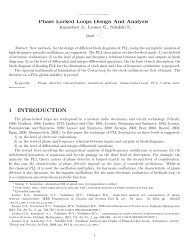Technical Sessions – Monday July 11
Technical Sessions – Monday July 11
Technical Sessions – Monday July 11
You also want an ePaper? Increase the reach of your titles
YUMPU automatically turns print PDFs into web optimized ePapers that Google loves.
MB-03 IFORS 20<strong>11</strong> - Melbourne<br />
� MB-03<br />
<strong>Monday</strong>, 14:00-15:30<br />
Meeting Room 102<br />
Hybrid Metaheuristics<br />
Stream: Meta-heuristics<br />
Invited session<br />
Chair: Celso Ribeiro, Department of Computer Science,<br />
Universidade Federal Fluminense, Rua Bogari 70, 22471-340, Rio de<br />
Janeiro, RJ, Brazil, celso@inf.puc-rio.br<br />
Chair: Stefan Voss, Wirtschaftsinformatik/Information Systems,<br />
University of Hamburg, Von-Melle-Park 5, 20146, Hamburg,<br />
Germany, stefan.voss@uni-hamburg.de<br />
1 - The Myopic Dynamic Programming Approach for the<br />
Knapsack Problem with Time-window<br />
Misato Okada, National Defense Academy, Computer Science<br />
Dept., Hasirimizu, Yokosuka, Kanagawa, Japan,<br />
em49034@nda.ac.jp, Seiji Kataoka<br />
The knapsack problem called KPTW is as follows: each item has the consecutive<br />
periods (time-window) in which we can take it, and the total amount of<br />
weights in each period has to be within the capacity. We propose the myopic<br />
dynamic programming that sees only expected states. It uses memory of limited<br />
size, but can reach an almost optimal solution. It also gives non-decreasing<br />
lower bounds anytime in the process. With effective upper bounds on them, a<br />
considerable number of variables can be pegged. Besides, by deleting redundant<br />
constraints, we succeed in diminishing KPTW to solvable size.<br />
2 - Iterated Hybrid Metaheuristics for Solving Single-<br />
Machine Total Weighted Tardiness Problems with<br />
Sequence-Dependent Setup Times<br />
Chun-Lung Chen, Department of Accounting Information,<br />
Takming University of Science and Technology, Taiwan,<br />
charleschen@takming.edu.tw<br />
An iterated hybrid metaheuristic is proposed to solve the single-machine<br />
scheduling problems with sequence-dependent setup times. The algorithm first<br />
integrates the principles of the Variable Neighborhood Search and Tabu Search<br />
to achieve a local optimal solution, and then a shaking procedure is developed<br />
to perturb the best solution to obtain a new initial solution attempt to escape<br />
the local optimal solution. To verify the proposed algorithm, computational<br />
experiments were conducted on benchmark problem sets and the results show<br />
the proposed algorithm outperforms several meta-heuristics.<br />
3 - Restart Strategies for GRASP with Path-relinking<br />
Heuristics<br />
Celso Ribeiro, Department of Computer Science, Universidade<br />
Federal Fluminense, Rua Bogari 70, 22471-340, Rio de Janeiro,<br />
RJ, Brazil, celso@inf.puc-rio.br, Mauricio Resende<br />
GRASP with path-relinking is a hybrid metaheuristic for combinatorial problems.<br />
A restart strategy in GRASP with path-relinking is a set of iterations on<br />
which the heuristic is restarted from scratch using a new seed for the random<br />
number generator. Restart strategies have been shown to speed up stochastic<br />
local search algorithms. We propose a restart strategy for GRASP with<br />
path-relinking. We illustrate the speedup obtained with this restart strategy on<br />
heuristics for the maximum cut problem, the maximum weighted satisfiability<br />
problem, and the private virtual circuit routing problem.<br />
� MB-04<br />
<strong>Monday</strong>, 14:00-15:30<br />
Meeting Room 103<br />
Spare Parts Inventory Systems<br />
Stream: Operations Management<br />
Invited session<br />
Chair: Scott Webster, Syracuse University, 13244, Syracuse, NY,<br />
United States, stwebste@syr.edu<br />
1 - A Spare Parts Provisioning Problem<br />
12<br />
Baris Balcioglu, Mechanical and Industrial Engineering,<br />
University of Toronto, 5 King’s College Road, M5S 3G8,<br />
Toronto, ON, Canada, baris@mie.utoronto.ca, Pedram Sahba,<br />
Dragan Banjevic<br />
We analyze a system of different fleets of machines where machines can fail<br />
due to a single type of critical component. A certain number of critical components<br />
are kept in a centralized inventory as spare parts with a shared inventory<br />
serving all fleets and reserved inventories for each fleet. Failed components<br />
are repaired in a single repair shop and the destination fleet can be chosen either<br />
on an FCFS basis or by considering static or dynamic priority rules among<br />
the fleets. Our numerical examples indicate that the best policy is a system<br />
operating under the inventory rationing policy.<br />
2 - A Finite Horizon Spare Parts Inventory Problem<br />
Nesim Erkip, Industrial Engineering, Bilkent University, 06800,<br />
Ankara, Turkey, nesim@bilkent.edu.tr<br />
While considering the life-cycle of a spare part inventory problem, one usually<br />
assumes that there are two main phases, followed by the final phase. The first<br />
main phase is when the part is steadily used for assembly, and the second main<br />
phase represents the periods when the part is no longer used as an input for<br />
manufacturing, but has a stochastic demand as a spare part. The final phase, on<br />
the other hand is usually represent by a single procurement. In this study, we<br />
propose a heuristic that will consider the joint problem that reflects the second<br />
main phase, with the final phase.<br />
3 - Final Purchase and End-of-Life Acquisition Decisions<br />
in Response to a Component Phase-Out Announcement<br />
Scott Webster, Syracuse University, 13244, Syracuse, NY,<br />
United States, stwebste@syr.edu, Dwayne Cole, Burak Kazaz<br />
We consider a problem faced by a durable-goods manufacturer of a product<br />
that is no longer manufactured but still under warranty. A supplier announces<br />
that a component of the product will be phased out and specifies a deadline for<br />
the final order. The manufacturer faces a two-stage decision problem: (1) the<br />
size of the final order and, in the event that the final order is less than actual requirements,<br />
(2) the design of a trade-in program for component harvesting. We<br />
investigate how a firm’s trade-in policy, decisions, and profits are influenced by<br />
industry and market characteristics.<br />
� MB-05<br />
<strong>Monday</strong>, 14:00-15:30<br />
Meeting Room 104<br />
Service Operation Management<br />
Stream: Service Science and Sustainability<br />
Invited session<br />
Chair: Ming Chun Tsai, Chung Hua University, 30012, Hsinchu,<br />
Taiwan, mctsai@chu.edu.tw<br />
Chair: Shu-Ping Lin, Technology Management, Chung Hua<br />
University, 707, Sec.2, WuFu Rd., 30012, Hsinchu, Taiwan,<br />
splin@chu.edu.tw<br />
1 - A Study of Inertia Type and Inertia Relational Model<br />
Ming Chun Tsai, Chung Hua University, 30012, Hsinchu,<br />
Taiwan, mctsai@chu.edu.tw, Ching-Chan Cheng<br />
Inertia is characteristic of human nature. Service providers can then take advantage<br />
of the inertia to keep up good relationships with their customers. Accordingly,<br />
this study are, first, to explore the core variables of the inertias by<br />
analyzing the dependencies among them through DEMATEL; second, to study<br />
the main factors affecting the inertias so as to establish an inertia relationship<br />
model. Finally, as a case in point, SEM will be utilized to empirically examine<br />
the customer inertia relationship model of the fashion business to identify the<br />
leading factors affecting its customer inertias.<br />
2 - Adopting Quality Functional Deployment to Enhance<br />
the Service Recovery Implementation<br />
Yahui Chan, Technology Management Dept., Chung Hua<br />
University, Hsinchu, Taiwan, silvia_219@yahoo.com.tw,<br />
Shu-Ping Lin




